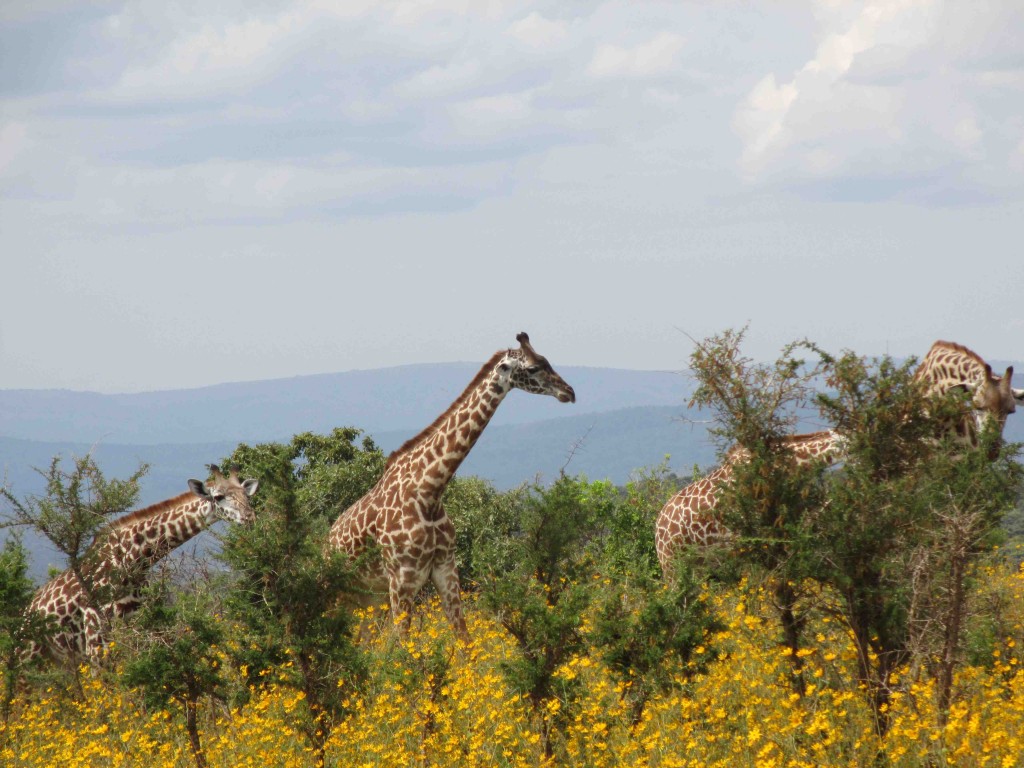After leaving Nyungwe, we headed to Akagera—Rwanda’s savanna park. Before mountain gorillas started making millions for Rwanda, Akagera was Rwanda’s flagship site for tourism. It better fit the traditional model for African tourism, in which people can spot large, charismatic mammals from the comfort of their land cruisers. Today, the park is overshadowed by Rwanda’s Volcanoes National Park (and its gorillas) in the north and by the larger, more famous savanna parks (such as Serengeti and Ngorongoro) found in the neighboring Tanzania. That being said, the manager of the park told us that over half of the tourists who visit Akagera are Rwandan, and he hopes to continue to develop the domestic tourism market.
Akagera bears the scars of the country’s troubled past. When refugees began to return following the genocide of the 1990s, two thirds of the park was carved away to provide land for new homes, new pastures and fields, and new beginnings. Today, lions no longer roam the park and other large mammal species are on a slow recovery. Local communities also struggle: the soils in the region are poor and the destruction of crops by marauding elephants and cape buffalo is a serious issue. (An electric fence was recently installed along the western length of the park in an attempt to keep people out and animals in. However, from our camping spot on our second night in the park, we saw herds of zebra and some buffalo grazing on the wrong side of the fence.)
But the park is beautiful: on either side of the reddish dirt roads, we see scraggly acacias and explosions of yellow wildflowers, large open valleys, and lakes and wetlands in which we see only the eyes and ears of submerged hippos. As we drove through the park—battling the occasional swarm of tsetse flies that besieged our vehicle—we saw giraffes with their awkward grace, topi, herds of zebra and impala, families of baboons, eland, hornbills, eagles, warthogs running with their tails held high in the air, and one massive crocodile. We camped for three nights and subsisted on nutella, peanut butter, and gin and tonics. From one of our camping spots, we could see far down into a valley in Tanzania, and in the fields around us, grazing animals were having their last meal before sunset.
Akagera is a national park, but it has been privatized. It is run by an organization called African Parks, which has a strong conservation mission and manages parks in countries throughout Africa. How does the Akagera Management Company balance the need to turn a profit with conservation? We spoke with the manager, Jes Gruner, who argued that private management allowed for greater efficiency and faster action both in the name of conservation and tourism development. Since African Parks took over in 2010, close to 200 local jobs have been created and new tourism infrastructure, including a tented lodge, has been built. Patrols for poaching and snare recovery have been ramped up, with 188 arrests and about 1500 snares recovered in a year, and teams are at work removing invasive plant species from the park. Once poaching has been significantly reduced, the management company plans to reintroduce lions and possibly black rhino to the park. African Parks often takes on struggling parks (fixer-uppers), like Akagera, that are failing to break even and are in ecological decline. They manage a range of parks, some which they expect will one day be profitable (they put Akagera in this category), some which they hope will one day pay for themselves, and some—like their parks in the Democratic Republic of Congo—which will likely never make money but have great ecological value.
Rwanda is currently considering privatizing all of its “tourism assets” including its other two parks, the Volcanoes National Park and Nyungwe. This creates some real uncertainty: will the new private management show the same concern for conservation that we’ve seen in Akagera? And for my friends working here in Nyungwe, the prospect of privatization creates personal insecurity: what will happen to their jobs if (or when) a new manager arrives? When African Parks took over Akagera, many of the guides and rangers who had worked in the park for years were fired, and the whole staff reorganized. Finally, what will happen to park outreach to local people (for example, conservation initiatives focused on supporting alternative livelihoods) around Nyungwe and the volcanoes? Will these efforts be dropped, as has occurred around Akagera, once privatization takes place?
